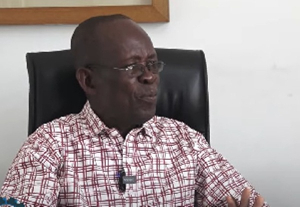Members of Parliament have expressed concern about the indiscriminate building of houses and their impact on urban and rural development and called for the strengthening of the institutional and legal framework for enforcing the regulations.
They also called for the strengthening of the capacities of planning officers and empowerment of District Assemblies to be effective in controlling and ensuring proper layout plans in communities.
These sentiments were expressed following a statement made by Mr Abraham Owusu Baidoo, NDC- Twifu/Hemang/Lower Denkyira in Parliament on Wednesday on the indiscriminate building of houses and their impact on rural and urban development.
He said in the quest for shelter, in almost all the regional capitals, people have erected structures that they called houses majority of which were built without any plan. "Some have even built on lands that are supposed to be used as roads, playing grounds, toilets, hospitals or schools, waterways and even on government lands".
Mr Baidoo said the rural areas are not spared as buildings were put up in crisscross manner without regard for access roads construction, extension of utility services and emergency routes in case of fire outbreaks.
He said in solving the problem, he recommended that the government should smoke out corrupt officials who often collect huge sums of money before processing documents and those who unduly delay the processing of documents.
District Assemblies should also ensure that officials, who knowingly collect money and give permit for building in areas meant for public utilities were sanctioned while national personnel with knowledge in planning were assigned to the assemblies to assist them.
Mr John Kwekucher Ackah, NDC-Aowin Suaman, said even though Law 207 emphasised on indiscriminate building and made suggestions about layouts for communities, most of the District Assemblies did not have offices for the Town and Country Department to make an impact. He said the statement should, therefore, be a reminder and a cue to the Assemblies to ensure that all housing projects had building plans and conformed to he law.
Dr Benjamin Kunbuor, NDC- Lawra-Nandom, said there was the need for a major law review to regulate land administration in the country. He said the role of planners had been reduced to only handling social and economic issues and the lack of integration of the two core areas was creating problems.
Prince Ernest Oduro-Mensah, NPP-Techiman South, said the issue of re-demarcation often created problems of planning and even resulted in congestion in most communities. He said commercial activities was also compounding the problem since the haphazard location of kiosks by petty traders and lotto agents was becoming an eyesore and called on the District Assemblies to enforce its byelaws.
Mr Enoch T. Mensah, NDC- Ningo-Prampram, said the issue of planning and its enforcement had been a major problem over the years while the engineering department of the City Engineers Department was ill-equipped to carry out its duties.
He said until the powers that be lent their political support to decisions taken by city authorities no action could be successful and called for the involvement of the people to find solutions to the land problems. Mr Mensah suggested that the Public Works Department should be converted into engineering department to assist the District Assemblies in planning the layout of their communities.
Mr Dominic Nitiwul, NPP-Bimbilla, said it was unfortunate that people often took the law into their own hands and freely got away with their negative actions and called for the non-politicisation of issues when it came to the wrong location of buildings.
Major Samuel K. Amponsah (rtd), NDC- Mpohor Wassa East, called for a change of attitude by the people and suggested that new townships should have proper planning so as to give a good image to the community. Mr Francis Agbotse, NDC-Ho West, said it was unfortunate that there was no planning policy for the country to which Mr E. T. Mensah said it was not true since one was prepared in 1999-2000.
Mr Samuel Ofosu-Ampofo, NDC-Fanteakwa, said Parliament needed to strengthen the agencies involved in the socio-economic development of the country. He said the capacity of the District Assemblies to perform was another issue, which should be looked at and called for the Department of Town and Country Planning to be equipped well.
Mr Kwabena Sarfo, NPP- Offinso South, said since District Assemblies did not own the lands and often found it difficult to control the activities of indiscriminate land developers, they should enter into agreement with the chiefs to ensure co-ordination and to prevent creation of slums.
Alhaji Seidu Amadu, NDC- Yapei-Kusawgu, said estate developers had failed the country since they had reneged in providing social services like link roads, water, electricity and telephone facilities to new areas thus creating urban ghettos.
Nii Adu Darku Mante, NPP-Klottey Korle, said the map of Accra was inadequate since it failed to indicate the true situation and size of the city while the irresponsible behaviour of planners needed to be checked.
Mr Mike Hammah, NDC-Effutu, said land use policies had been so fragmented that it was difficult for land administration in the country and suggested that national social policies should be set up to ensure integrated and rational land policy.
General News of Thursday, 20 June 2002
Source: gna












